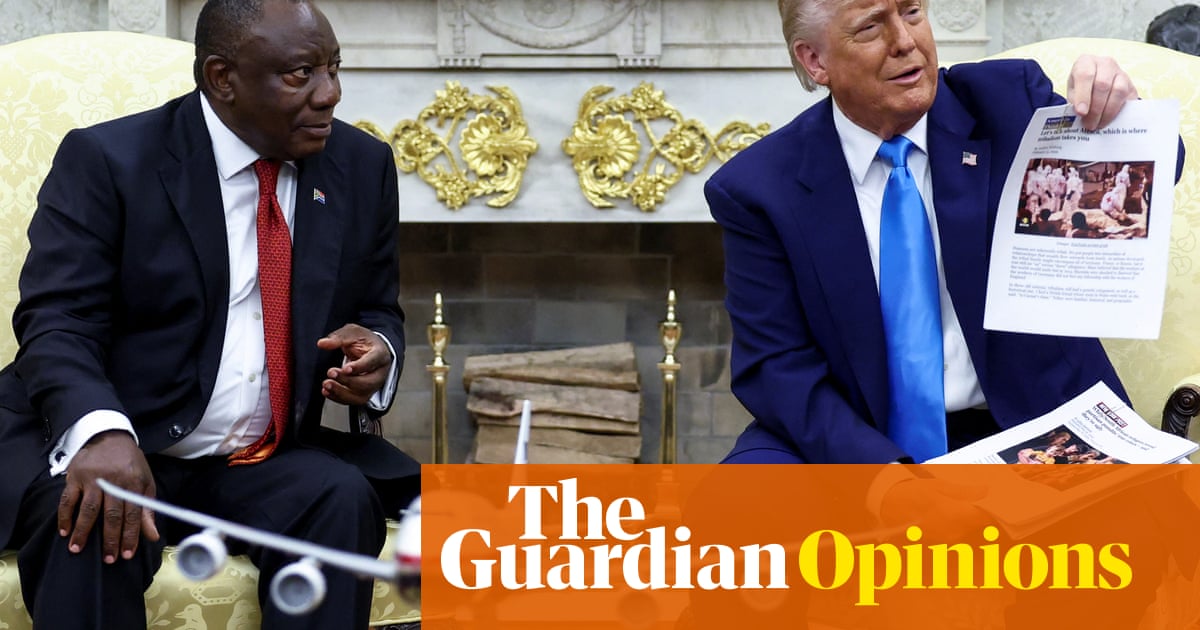The meeting at the White House between Donald Trump and theSouth African president, Cyril Ramaphosa, was, at its heart, about the preservation of essential historical truths. The US president’s claims of white genocide conflict with the actual racial persecution and massacres that took place during the two centuries of colonisation and nearly 50 years of apartheid in South Africa.
It is not enough to be affronted by these claims, or to casually dismiss them as untruths. These statements are a clear example of how language can be leveraged to extend the effects of previous injustices. This mode of violence has long been used against Indigenous Africans. And it cannot simply be met with silence – not any more.
The Kenyan writer Mzee Ngũgĩ wa Thiong’o wrote: “Language conquest, unlike the military form, wherein the victor must subdue the whole population directly, is cheaper and more effective.”
African nations learned long ago that their fates are inextricably linked. When it comes to interactions with the world beyond our continent, we are each other’s bellwether. In 1957, the year before my birth,Ghanabecame the first Black African country to free itself from colonialism. After the union jack had been lowered, our first prime minister, Dr Kwame Nkrumah, gave a speech in which he emphasised that, “our independence is meaningless unless it is linked up with the total liberation of Africa”.
Shortly after, in 1960, was the Sharpeville massacre inSouth Africa, which resulted in 69 deaths and more than 100 wounded. In Ghana, thousands of miles away, we marched, we protested, we gave cover and shelter. A similar solidarity existed in sovereign nations across the continent. Why? Because people who looked like us were being subjugated, treated as second-class citizens, on their own ancestral land. We had fought our own versions of that same battle.
I was 17 in June 1976, when the South AfricanSoweto uprisingtook place. The now-iconic photo of a young man, Mbuyisa Makhubo, carrying the limp, 12-year-old body of Hector Pieterson, who had just been shot by the police, haunted me for years. It so deeply hurt me to think that I was free to dream of a future as this child was making the ultimate sacrifice for the freedom and future of his people. Hundreds of children were killed in that protest alone. It is their blood, and the blood of their forebears that nourishes the soil of South Africa.
The racial persecution of Black South Africans was rooted in a system that was enshrined in law. It took worldwide participation through demonstrations, boycotts, divestments and sanctions to end apartheid so that all South Africans, regardless of skin colour, would be considered equal. Nevertheless, the effects of centuries-long oppression do not just disappear with the stroke of a pen, particularly when there has been no cogent plan of reparative justice.
Despite making up less than 10% of the population, white South Africans controlmore than 70% of the nation’s wealth. Even now, there are a few places in South Africa where only Afrikaners are permitted to own property, live, and work. At the entrance to once such settlement, Kleinfontein, is an enormousbust of Hendrik Verwoerd, the former prime minister who is considered the architect of apartheid.
Another separatist town, Orania, teaches only Afrikaans in its schools, has its own chamber of commerce, as well as its own currency, the ora, that is used strictly within its borders. It has been reported that inside the Orania Cultural History Museum there is a bust of every apartheid-era president except FW de Klerk, who initiated reforms that led to the repeal of apartheid laws.
Both Kleinfontein and Orania are currently in existence, and they boast a peaceful lifestyle. Why had the America-bound Afrikaners not sought refuge in either of those places?
Had the Black South Africans wanted to exact revenge on Afrikaners, surely, they would have done so decades ago when the pain of their previous circumstances was still fresh in their minds. What, at this point, is there to be gained by viciously killing and persecuting people you’d long ago forgiven?
According to the UN Department of Economic and Social Affairs,half of the population of South Africa is under 29, born after the apartheid era and, presumably, committed to building and uplifting the “rainbow nation”. For what reason would they suddenly begin a genocide against white people?
Ramaphosa was blindsided by Trump with those unfounded accusations and the accompanying display of images that were misrepresented – in one image, pictures of burials were actually from Congo. Trump refused to listen as Ramaphosa insisted that his government did not have any official policies of discrimination.
“If you want to destroy a people,” Archbishop Desmond Tutu once said,“you destroy their memory, you destroy their history.”Memory, however, is long. It courses through the veins of our children and their children. The terror of what we have experienced is stored at a cellular level. As long as those stories are told, at home, in church, at the beauty and barber shop, in schools, in literature, music and on the screen, then we, the sons and daughters of Africa, will continue to know what we’ve survived and who we are.
Mzee Ngũgĩ wa Thiong’o wrote: “The process of knowing is simple. No matter where you want to journey, you start from where you are.” We journey forward with a history that cannot be erased, and will not be erased. Not while there are children dying in the mines of the Congo, andrape is being used as a weapon of war in Sudan.
Our world is in real crisis; real refugees are being turned away from the borders of the wealthiest nations, real babies will die because international aid has been abruptly stopped, and real genocides are happening in real time all across the globe.
John Dramani Mahama is president of the Republic of Ghana
